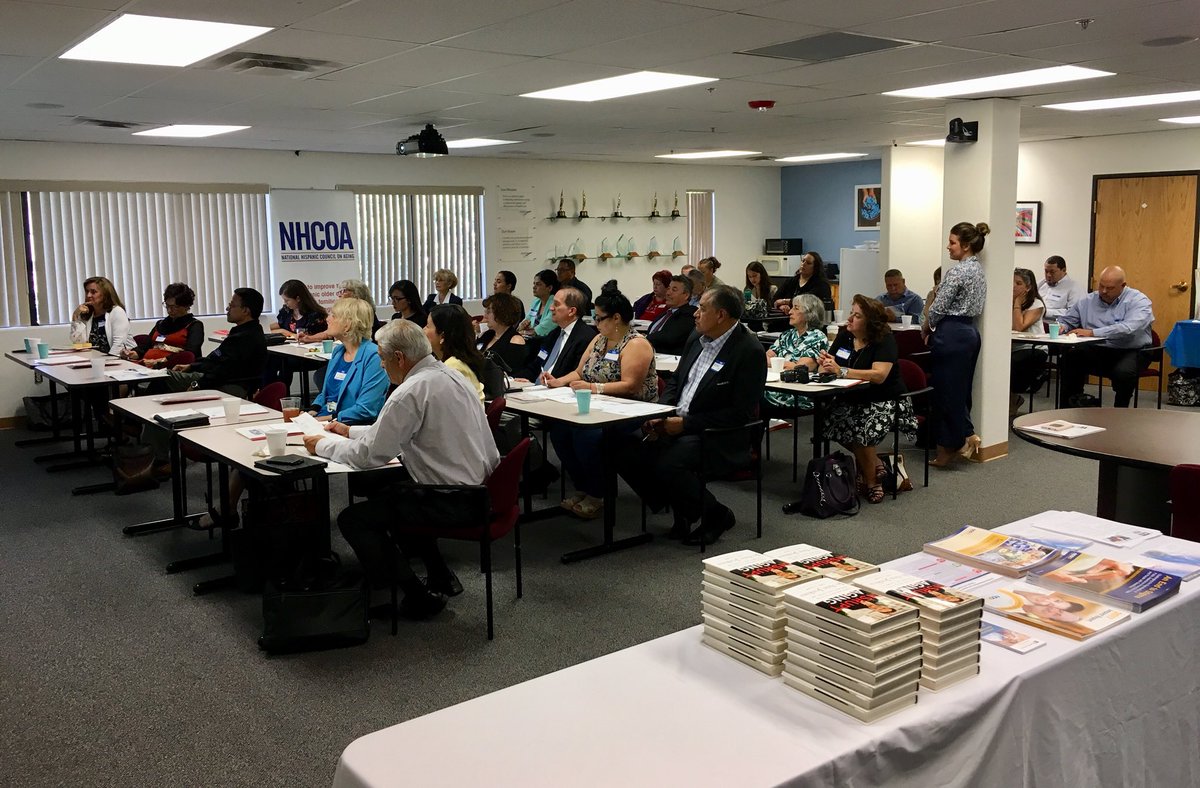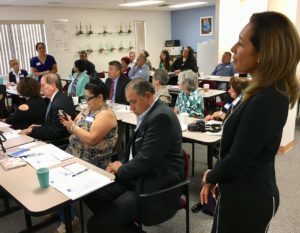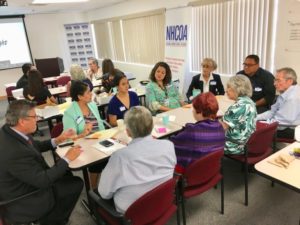This article originally appeared on the NHCOA blog.

The Reframing Aging Thought Leaders Roundtable is an initiative of the National Hispanic Council on Aging (NHCOA). The second of three 2018 roundtables was held in New Mexico. “Using our national platform, we have been working to transform the negative perceptions of Hispanic older adults in the US; it is not an issue affecting just Latinos, but older adults in general,” was just of the highlights from Dr. Yanira Cruz, President of NHCOA, during her keynote address.
“Our commitment to older adults is to contribute to changing the national perception about aging. This is not a topic easy to reinvent, but we have the responsibility to build a bridge to connect older adult populations with an equal, just and inclusive society providing them with affordable opportunities,” said Cindy Padilla, NHCOA’s Board Chairwoman, who guided the roundtable.
 Building intergenerational bridges can play a huge role in Reframing Aging. For this reason, it is very important to include the support of millennials, as well as their training to become caregivers. “Let’s include younger generations in this conversation instead of competing against them. Millennials are playing an increasing role in caregiving. Ten million of them are sacrificing themselves and caring for someone,” said Dr. Yanira Cruz.
Building intergenerational bridges can play a huge role in Reframing Aging. For this reason, it is very important to include the support of millennials, as well as their training to become caregivers. “Let’s include younger generations in this conversation instead of competing against them. Millennials are playing an increasing role in caregiving. Ten million of them are sacrificing themselves and caring for someone,” said Dr. Yanira Cruz.
Isabel Aldana (21) is a student of Political Science interested in changing the conversation about ageism in the US. She is just one of the 36 Thought Leaders who attended the Reframing Aging Roundtable, held in Albuquerque, NM on August 23, 2018. “One thing that really resonated with me was the fact that ageism is discrimination! We must seek social justice for older adults and we cannot marginalize a particular group based on age, assuming their abilities or disabilities,” said Aldana for whom an older adult is her source of inspiration and wisdom.
The Reframing Aging campaign is an effort of the Leaders of National Aging Organizations (The American Society on Aging, Grantmakers in Aging, the Gerontological Society of America, AARP, the American Federation for Aging Research, the American Geriatric Society, the National Council on Aging, and NHCOA), and based on research conducted by the FrameWorks Institute™ which highlights how messages such as “fighting aging” or “staying young” increase ageist attitudes.
“The City of Albuquerque is invested in intergenerational opportunities between our younger millennials and our aging population because there is such an important and valuable contribution that both of those communities make when combined – benefiting our community overall,” said Anna Sanchez, Director of the Department of Senior Affairs for the City of Albuquerque. For Sanchez, it is fundamental to be more collaborative in the messaging on how we frame our words and our communication strategies around older adults, recognizing the many contributions they provide to our communities.
 This conversation and others aid NHCOA in building new constructive and productive approaches and terminology around aging in Spanish and in English, allowing us to be the voice for the voiceless by continuing the momentum around reframing aging at the local and national levels. “We literally have to reframe the conversation; we have to stop using a lot of the language that demeans older adults. Specifically in the Latino community, we tend to revere older adults because they were usually involved in raising us and assisting us with raising our kids. We need to revert to the tradition of honoring our older adults instead of disrespecting them,” said Mauro Walden-Montoya, President of the Albuquerque LGBTQ Chamber of Commerce.
This conversation and others aid NHCOA in building new constructive and productive approaches and terminology around aging in Spanish and in English, allowing us to be the voice for the voiceless by continuing the momentum around reframing aging at the local and national levels. “We literally have to reframe the conversation; we have to stop using a lot of the language that demeans older adults. Specifically in the Latino community, we tend to revere older adults because they were usually involved in raising us and assisting us with raising our kids. We need to revert to the tradition of honoring our older adults instead of disrespecting them,” said Mauro Walden-Montoya, President of the Albuquerque LGBTQ Chamber of Commerce.
Solutions are available if we all work together: the power of the media, the intergenerational connection, and access to diverse communities, are important ways to positively influence the conversation about ageism. “Reframing aging in the Hispanic/Latino community requires us to amplify voices, create support systems, and build trust through collaborative leadership – all while taking the time to listen to community needs. We must first start with reframing the ways in which we partner. We must amplify the voices of those partners already embedded in the communities we serve and dig deeper into collaborations within the communities we hope to serve in a more impactful and intentional way moving forward. Partnerships like the one we have with NHCOA are critical,” said Vivian Nava-Schellinger, Manager of National and Community partnerships for the National Council on Aging.
Others contributors and presenters that shared in their areas of expertise who participated at the New Mexico Thought Leaders Roundtable:
- Julie Sweetland, Vice President for Strategy and Innovation at the FrameWorks Institute
- Eugene Varela, State Director at AARP New Mexico
- Mary Twomey, Aging Services Program Specialist from the Office of Elder Justice & Adult Protective Services, ACL
- Eulimar Nuñez, Digital Editor at UnivisionNoticias
The Reframing Aging Thought Leaders Roundtable was sponsored by AARP, NCOA and Healthinsight.
The opinions expressed in this article are those of the author and do not necessarily reflect those of the Diverse Elders Coalition.

